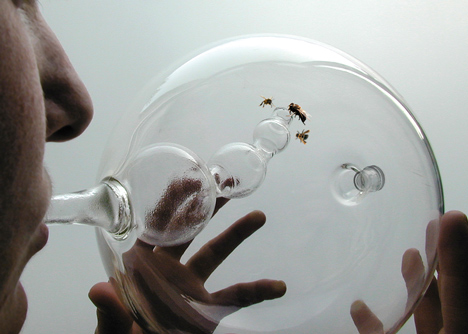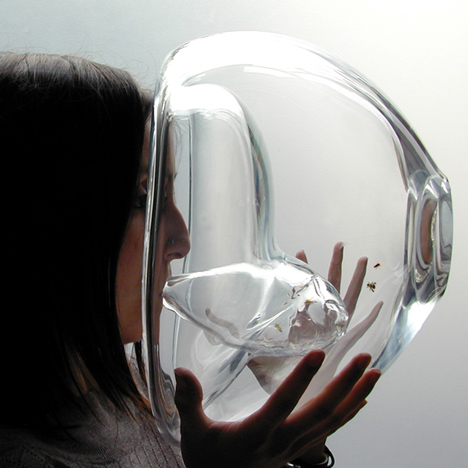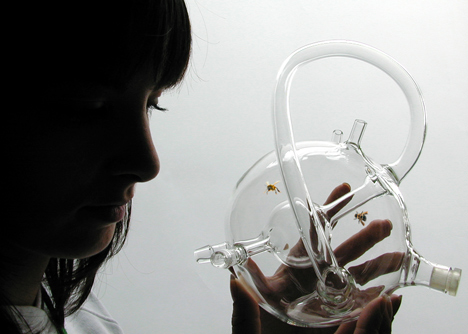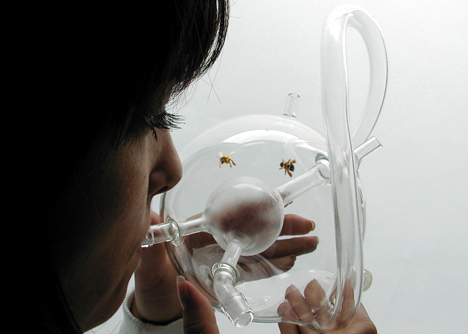Agriculture




- Beekeeping: Profiting From A Gold Mine
If you look at fields full of flowering crops or wild flowers in the countryside, or at garden and park flowers in the cities, you are not only looking at beauty but also at gold ? thousands of tons of valuable honey. Liquid gold sitting there, all for...
- Honeybees Could Help Scientists Build A Better Aircraft
Honeybees are inspiring scientists at Australia?s Vision Centre to help build a robot aircraft. Bees are able to land anywhere with amazing precision and grace, and this skill could soon be included in future aircraft. Scientists found that honeybees...
- How Bees Make Honey
It has been said that except for man, nowhere in the world is there anything to compare with the incredible efficiency of the industry of the honeybee. Inside the beehive each bee has a special job to do and the whole process runs smoothly.Bees...
- Scientists Discover Bees Can ?turn Back Time,? Reverse Brain Aging
Scientists at Arizona State University have discovered that older honey bees effectively reverse brain aging when they take on nest responsibilities typically handled by much younger bees. While current research on human age-related dementia focuses on...
- Missouri Beekeeping With Erin Mullins
Today we welcome Erin Mullins. Erin is a Missouri girl who discovered the joy of beekeeping! Hello, my name is Erin Mullins and I?m from the northwest corner of Missouri. I am 19 years old attending college to become a Nurse. I still live at home with...
Agriculture
Honey bees can be trained to detect cancer "in ten minutes
Portuguese designer Susana Soares has developed a device for detecting cancer and other serious diseases using trained bees

The bees are placed in a glass chamber into which the patient exhales; the bees fly into a smaller secondary chamber if they detect cancer.
"Trained bees only rush into the smaller chamber if they can detect the odour on the patient's breath that they have been trained to target," explained Soares, who presented her Bee's project at Dutch Design Week in Eindhoven last month.

Scientists have found that honey bees - Apis mellifera - have an extraordinary sense of smell that is more acute than that of a sniffer dog and can detect airborne molecules in the parts-per-trillion range.
Bees can be trained to detect specific chemical odours, including the biomarkers associated with diseases such as tuberculosis, lung, skin and pancreatic cancer.
Bees have also been trained to detect explosives and a company called Insectinel is training "sniffer bees" to work in counter-terrorist operations.

"The bees can be trained within 10 minutes," explains Soares. "Training simply consists of exposing the bees to a specific odour and then feeding them with a solution of water and sugar, therefore they associate that odour with a food reward."
Once trained, the bees will remember the odour for their entire lives, provided they are always rewarded with sugar. Bees live for six weeks on average.
"There's plenty of interest in the project especially from charities and further applications as a cost effective early detection of illness, specifically in developing countries," Soares said.

Here is a project description by Susana Soares:
Bee's / Project
Bee's explores how we might co-habit with natural biological systems and use their potential to increase our perceptive abilities.
The objects facilitate bees' odour detection abilities in human breath. Bees can be trained within 10 minutes using Pavlov?s reflex to target a wide range of natural and man-made chemicals and odours, including the biomarkers associated with certain diseases.
The aim of the project is to develop upon current technological research by using design to translate the outcome into systems and objects that people can understand and use, engendering significant adjustments in their lives and mind set.
How it works
The glass objects have two enclosures: a smaller chamber that serves as the diagnosis space and a bigger chamber where previously trained bees are kept for the short period of time necessary for them to detect general health. People exhale into the smaller chamber and the bees rush into it if they detect on the breath the odour that they where trained to target.
What can bees detect?
Scientific research demonstrated that bees can diagnose accurately at an early stage a vast variety of diseases, such as: tuberculosis, lung and skin cancer, and diabetes.
Precise object
The outer curved tube helps bees avoid from flying accidentally into the interior diagnosis chamber, making for a more precise result. The tubes connected to the small chamber create condensation, so that exhalation is visible.
Detecting chemicals in the axilla
Apocrine glands are known to contain pheromones that retain information about a person's health that bees antennae can identify.
The bee clinic
These diagnostic tools would be part of system that uses bees as a biosensor.
The systems implies:
- A bee centre: a structure that facilitates the technologic potential of bees. Within the centre is a beefarm, a training centre, a research lab and a healthcae centre.
- A bee centre: a structure that facilitates the technologic potential of bees. Within the centre is a beefarm, a training centre, a research lab and a healthcae centre.
- Training centre: courses can be taken on beetraining where bees are collected and trained by beetrainers. These are specialists that learn beetraining techniques to be used in a large scope of applications, including diagnosing diseases.
- BEE clinic: bees are used at the clinic for screening tests. These insects are very accurate in early medical diagnosis through detection on a person's breath. Bees are a sustainable and valuable resource. After performing the diagnose in the clinic they are released, returning to their beehive.
Bee training
Bees can be easily trained using Pavlov?s reflex to target a wide range of natural and man-made chemicals odours including the biomarkers associated with certain diseases. The training consists in baffling the bees with a specific odour and feeding them with a solution of water and sugar, therefore they associate that odour with a food reward.
Source: http://www.dezeen.com
- Beekeeping: Profiting From A Gold Mine
If you look at fields full of flowering crops or wild flowers in the countryside, or at garden and park flowers in the cities, you are not only looking at beauty but also at gold ? thousands of tons of valuable honey. Liquid gold sitting there, all for...
- Honeybees Could Help Scientists Build A Better Aircraft
Honeybees are inspiring scientists at Australia?s Vision Centre to help build a robot aircraft. Bees are able to land anywhere with amazing precision and grace, and this skill could soon be included in future aircraft. Scientists found that honeybees...
- How Bees Make Honey
It has been said that except for man, nowhere in the world is there anything to compare with the incredible efficiency of the industry of the honeybee. Inside the beehive each bee has a special job to do and the whole process runs smoothly.Bees...
- Scientists Discover Bees Can ?turn Back Time,? Reverse Brain Aging
Scientists at Arizona State University have discovered that older honey bees effectively reverse brain aging when they take on nest responsibilities typically handled by much younger bees. While current research on human age-related dementia focuses on...
- Missouri Beekeeping With Erin Mullins
Today we welcome Erin Mullins. Erin is a Missouri girl who discovered the joy of beekeeping! Hello, my name is Erin Mullins and I?m from the northwest corner of Missouri. I am 19 years old attending college to become a Nurse. I still live at home with...
